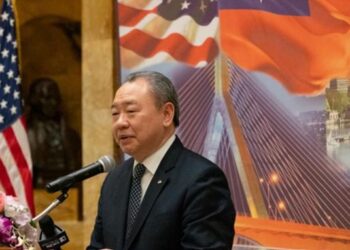There is a rapidly escalating situation, South Korea is witnessing a political crisis that could have far-reaching implications for the region, as protests and political unrest intensify.
In a Saturday WarRoom conversation between Steve Bannon and retired Colonel John Mills, the two highlighted the dangerous convergence of internal political turmoil and external Chinese interference that threatens the stability of one of the U.S.’s most trusted allies in East Asia.
President Yoon Suk-yeol is facing a political and social storm as thousands take to the streets in opposition to his government. Demonstrators have called for an end to martial law, but a significant portion of the protesters, according to Bannon and Mills, are reportedly Chinese nationals who have been flown in to incite further unrest. “One-third to two-thirds of these protests are Chinese,” Mills claimed, raising alarms about China’s growing influence in South Korea’s internal affairs.
The political landscape in South Korea has become increasingly divided. The left-wing Democratic Party, led by Lee Jae-myung, has mounted a significant challenge to President Yoon’s leadership, accusing him of authoritarianism. Lee, who was recently convicted of malfeasance, has been a vocal critic of U.S. military presence in South Korea, calling American forces an "occupation force” and pushing for the removal of THAAD missile systems. His anti-U.S. stance aligns with China’s broader geopolitical goals, as Beijing seeks to expand its regional influence.
In response to mounting political pressure, President Yoon declared martial law on December 3rd, 2023, a highly controversial move. However, as Bannon and Mills pointed out, Yoon’s decision was strategic. The martial law declaration allowed him to launch a raid on the National Election Commission, which, according to Yoon’s government, was necessary to investigate suspected Chinese interference in South Korea’s elections. While legally justified, this move has sparked widespread outrage and fear of authoritarianism, fueling the protests.
South Korea’s political system is becoming increasingly polarized as the situation unfolds. Yoon’s government has been at odds with the Democratic Party, which controls the National Assembly. The conservative People Power Party, in support of Yoon, is facing fierce opposition from the left. Mills, a former U.S. military officer with deep knowledge of East Asian geopolitics, warned that South Korea is in the midst of a power struggle that could weaken its defense posture against China. "This is a critical moment for South Korea,” Mills said. "If this government falls, the entire U.S.-South Korea alliance could be destabilized.”
The political crisis in South Korea is not only a domestic issue but also a matter of strategic importance for the United States. The U.S. military has had a presence in South Korea since the Korean War, with approximately 28,000 troops stationed in the country. South Korea plays a pivotal role in the U.S.’s strategy to counter China’s growing influence in the region. If the protests and political unrest result in the downfall of President Yoon, it could create a vacuum that China may seek to exploit to undermine the U.S.-South Korea alliance.
Adding to the complexity of the situation is the broader regional context. As Mills noted, South Korea is also attempting to rebuild its strained relationship with Japan, a key partner in the U.S.-led effort to counter China. However, the political left in South Korea, led by figures like Lee Jae-myung, is fiercely anti-Japan, further complicating the situation. With tensions between China, Japan, and South Korea already high, the potential collapse of Yoon’s government could leave South Korea vulnerable to Chinese influence.
Bannon and Mills also expressed concern over the influence of the media in shaping public perception of the crisis. The mainstream media in South Korea, they argued, is largely sympathetic to the left-wing narrative, which portrays the situation as a struggle against authoritarianism. This portrayal, according to Bannon and Mills, obscures the deeper geopolitical battle playing out behind the scenes, where China is actively working to weaken South Korea’s government and undermine its alliance with the United States.
The situation in South Korea is rapidly evolving, and with it, the stakes for U.S. interests in East Asia. As the political crisis deepens, the U.S. and its allies must closely monitor the developments in South Korea and prepare for potential fallout that could reshape the region’s security dynamics. For now, the people of South Korea remain at the center of a high-stakes geopolitical struggle, one that could have profound consequences for the future of East Asian stability.
For more context, watch this Saturday segment:




![Bannon’s WarRoom, Show Clip Roundup 10/17/2024 [PM]](https://warroom.org/wp-content/uploads/2024/10/GQ-06-Bannon-061517-350x250.webp)
![Bannon’s WarRoom, Show Clip Roundup 11/7/2024 [AM]](https://warroom.org/wp-content/uploads/2024/11/WarRoom-Logo-75x75.jpg)
This is incredible !!!! Shawn Ryan ( who uses same Attorney @timparlatore as @realDonaldTrump @PeteHegseth ) and Sam Shoemate consider that the Las Vegas attack was NOT Matt Livelsberger body in the Truck and the Tesla Truck drove there autonomously . Start at 22:30 https://youtu.be/xglaXVtQcis?si=SQdSYM4MH0YVtpqH&t=1351
Is this the Democrats next plan to take out @realDonaldTrump ??? “Iranian MANPADs Are Coming Through the Border” – Intelligence Officer’s Shocking Message https://www.youtube.com/watch?v=KQoH8qqKm50
Full Video , https://www.youtube.com/watch?v=xglaXVtQcis
China and Denmark are working Together BIGGLY !!!!!!!! Denmark Reaffirms Its Commitment to the One-China Policy http://www.mfa.gov.cn/eng/xw/zwbd/202405/t20240530_11366176.html
Its plausible to say that China was Willing to agree to President Trump’s 2020 Trade Agreement because they were about to Spread COVID to the world !!!!!!!! SO to Keep CHINA and RUSSIA in a Negotiating Position US allied countries and any Country for that matter need to join Trump in Tariff Trade agreements that will encourage China to Negotiate Free and Fair trade agreements and this include annual Inspections of BIOLabs between ALL TRade Partners like we do NUCLEAR Plants !!!!!!!!! https://ustr.gov/phase-one
The Iranian Spy Ring in Blinken’s State Department Mark Levin show
https://www.youtube.com/watch?v=enIgJnnf-Jw
You know why they’re afraid of Pete Hegseth because former Deputy Defense Secretary Austin was just a placeholder and Blinken ran our Pentagon with the Iranain and spies for China that Blinken’s State Department hired as Deputy Defense Secretaries.
Pete is going to learn everything that they did.